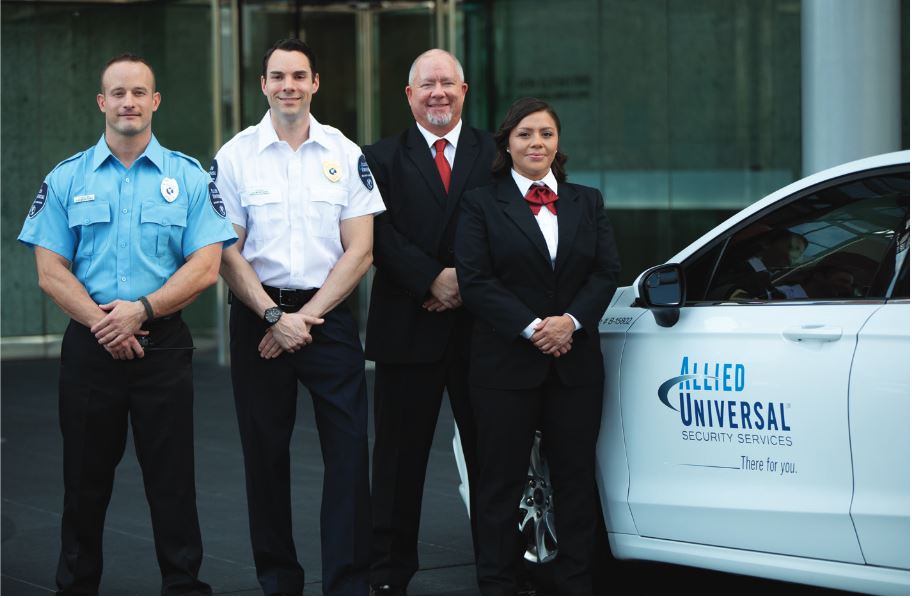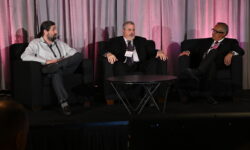Manned Security Meets Systems Solutions: Allied Aims for Universal Security Supremacy
Allied Universal brass discuss parlaying the acquisition of Securadyne into a technology play as powerful as its manpower position.

The nerve center of Allied Universal’s operations is its monitoring and response center, where security intervention specialists provide 24/7 surveillance. The company has become North America’s leading manned security firm and now has sights set on doing the same in security technology systems.
One of the pushes on the technology side has been creating solutions that can act as force multipliers. Can you give some perspective on the concern or reality of technology replacing manned security versus complementing it? Do you feel it is displacing some manpower, or is it just augmenting it? Now that you have such a vested interest in both sides, obviously, you want to make them as complementary as possible, but to what extent is technology affecting those positions, if you will, or displacing manned security?
BOETHEL: Technology today, like the Cloud and to a lesser extent Big Data, allows us to do things that we couldn’t do 10 years ago. Some of those things were traditional responsibilities of manned guarding but can now be done through virtual tours, interactive services or other forms of virtual guarding. We can do things technologically today that are relatively new and somewhat disruptive, but we don’t think it’s a zero-sum game. We think differently. We believe the two are complementary and best deployed in concert with one another. How do we bring both to bear, with an end user, in order to create incremental value, not at the expense of one or the other but for the benefit of the customer?
RICHMOND: There’s going to be some degree of task transferring, if you will, but there is no doubt that the human element is always going to be a part of the security model. Probably the security officer in the future is going to be even more productive, better paid and better equipped. Utilizing all of the different aspects of technology, security personnel will be a much tighter, integrated part of the solution and overall delivery system. As a matter of fact, you’re creating more intelligence, more information and more decision-making capabilities in the hands of the security officers so that they become even more valuable, more responsive and more decision-making capable.

AU’s 215,000 security professionals protect 42,000+ client sites, covering markets like higher education, healthcare and corporate campuses.
BOETHEL: As some of that task transfer occurs, it’s not about the disintermediation, if you will, of the guard. It’s about enablement, and it’s about efficiency. Man guarding serves a variety of very unique and highly valuable functions, not the least of which is first response. I don’t think anybody today is talking about technology that’s displacing of guards when it comes to first response or emergency management. But to the extent that we can equip those guards with technology to provide better situational awareness and, in some instances, can be prescriptive with respect to what actions need to be taken, then we’ve created a much more valuable solution. It’s a multifaceted solution. It’s technology enabled. It’s situationally aware, it’s much more efficient and it’s more cost effective. It’s not one or the other.
MULLISON: Unquestionably, there are some things that machines will do better than people, but it won’t be everything. It’s going to be a long time before technology can administer CPR. It’ll be a long time before technology can go get an AED and use it to help somebody in need. It’s going to be a long time before technology can warmly greet somebody and make them feel welcome. Our vision is not one of replacing people as much as it is bringing people and technology together to drive better outcomes.
JONES: Given where the cost of labor is, customers are always looking to use technology to augment some manned physical personnel locations. That’s been going on for the past 10 to 20 years regardless of whether we are in this business or not. Right after 9/11, the number of manned guards grew significantly. Then within a few years technology like major camera upgrades, physical turnstiles, etc. eliminated guards. So this proliferation everyone is afraid of has already happened. The balance is already there between how much technology is in manned guarding. Certainly technology continues to improve, and manned guarding along with it.
Situational awareness, risk management and threat awareness technologies are out there creating better information flows that manned guarding operations use to provide better security services that mitigate risk within our customer base. I don’t see a displacement. I see manned guarding growing at a smaller pace than technology, but continuing to grow. If technology wasn’t where it is today manned guarding would be growing probably two to three times the pace. But both sides of the security spectrum are going to continue to grow. No matter what, you need people to use that technology and you need people to respond to the emergency.
If you look at the competitive landscape, what concerns you the most for the technology services business? Is it the local, regional, national or global providers? How are you planning on differentiating yourself among them?
BOETHEL: There’s a few different ways we differentiate ourselves in the marketplace, one of which is our vertical market expertise. Some technology service providers are focusing on hardware, the sale of the installation thereof and doing so in a way that really isn’t all that unique, market to market. We take a very different approach. We invest in development of subject matter expertise, which you need for a given vertical. People talk a lot about that, but the extent to which it’s implemented in the marketplace is debatable. We really go deep within the customer’s organization, much deeper than, for example, an IT or an electrical contractor might go.
So when I’m asked if I’m concerned about new market entrants, the answer is not a great deal. We’ve created a pretty unique niche for ourselves. If you are an integrator focusing conventionally on the installation and service of commercial off-the-shelf products, you’re going to struggle with the commoditization that comes along with that. If, however, you’re really going deep into your customer’s organization, with an eye towards not only risk mitigation but actual business-process optimization, you’re able to create value in different ways even if you do it through the same exact technology that you’ve otherwise deployed for loss prevention. That’s a big part of our strategy for differentiation.
The vertical market expertise that we possess creates a different conversation. It’s a different vernacular. It’s a different value proposition. It’s a different ROI, and it’s an approach that relatively few players in our space take. If you think about which companies out there in the marketplace today can truly provide end-to-end solutions with a holistic appreciation for all the different aspects of security and safety, the list of competitors shrinks really, really fast. There are only a select few companies in the world today who can have that conversation with a customer, bringing to bear all of those different disciplines into a single end-to-end solution. That is at the core of our differentiation strategy.
RICHMOND: Fundamentally, we tried to create a DNA in the company that ensures that we have the right kind of integration of all of the different product and service lines. The front-end engagement with the customer, the understanding of the issues, needs, pain points of the customer, and how you bring a broader integrated solution sets to the customer is something we have been putting a tremendous amount of investment in, from an education, awareness and accountability standpoint and how we measure performance. Those attributes have been put in place and designed, and culturally are a part of who we are. I think that is going to be absolutely critical to our success. It starts with our CEO, all the way down.
JONES: The companies that we are really in a space race with are the two big international players, Securitas and G4S. We are all approaching it by looking at the overall security capabilities and solutions provided to customers. We all know it’s a combination of technology and manned guarding. We believe our size, scale and service capabilities within the United States give us a unique advantage. We will never underestimate those two organizations, but we certainly have more resources in the U.S., and our goal is to truly leverage that and build that out to get a nice lead on them.

The big challenge when you grow is remaining innovative and nimble. Is it really possible on a big scale to do that?
JONES: We certainly think so. That’s actually one of our core business philosophies, being flexible and nimble and to fight bureaucracy. We believe our ability to pivot with the technology and execute on that strategy shows that we have a vision for the future, and we’re able to execute on it. Our ability to expand and grow with our new Risk Advisory and Consulting Services business again shows that we act on needs we see in the industry.
We’re always trying to stay one step ahead of not only the industry but trying to think ahead of what our customers need. We were one of the first to partner with some of the robotics companies and put robots in the field to determine the capabilities, the limitations and where it really works well. We’ve got accounts where we work with drones. We’ve got a castle where we’re doing complete 100% managed services, and doing remote monitoring of the video and access control systems.
Then we’ve got accounts that are just traditional manned guarding. As we continue to look at the future of the industry, there’s a lot on the horizon that could come about depending on where technology goes. We are constantly having those discussions. If the technology gets there, we want to be first to market with rolling out solutions.
If you enjoyed this article and want to receive more valuable industry content like this, click here to sign up for our FREE digital newsletters!

Security Is Our Business, Too
For professionals who recommend, buy and install all types of electronic security equipment, a free subscription to Commercial Integrator + Security Sales & Integration is like having a consultant on call. You’ll find an ideal balance of technology and business coverage, with installation tips and techniques for products and updates on how to add to your bottom line.
A FREE subscription to the top resource for security and integration industry will prove to be invaluable.














